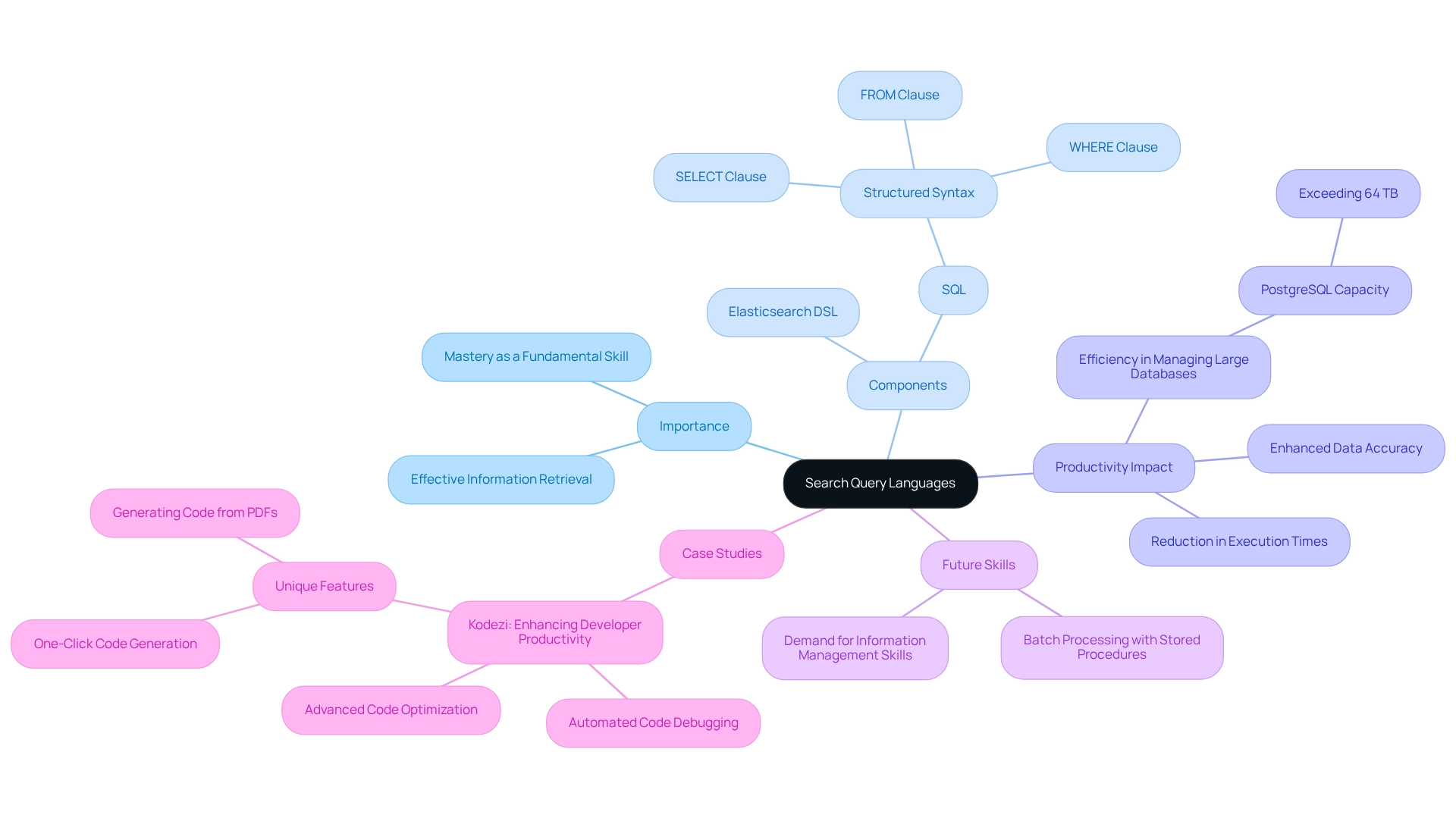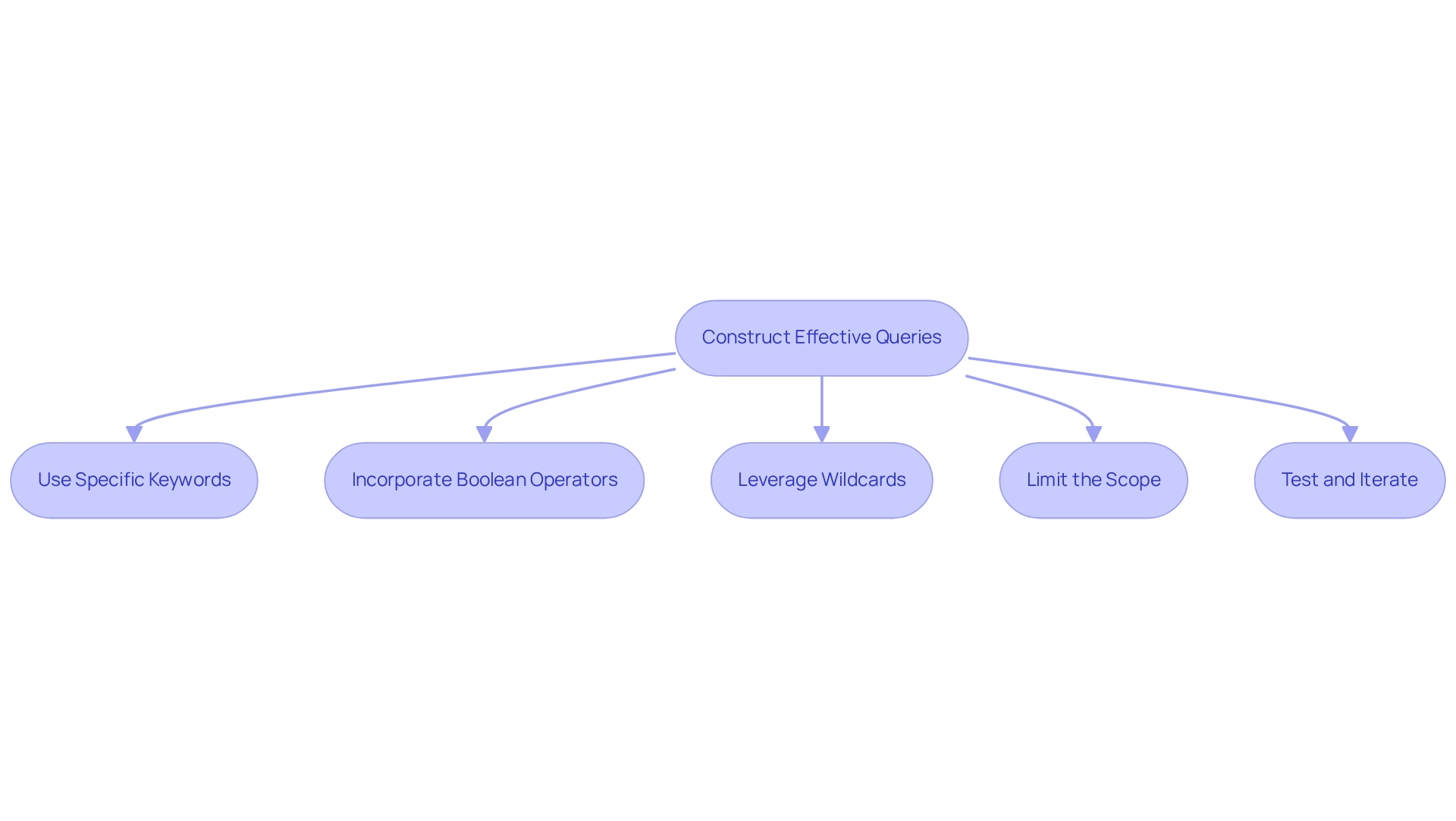Overview
The article highlights the coding challenges developers encounter, particularly in mastering search query language efficiency. It underscores the significance of effective query construction and optimization techniques. Kodezi addresses these challenges through its specific features, offering best practices such as:
- Using specific keywords
- Leveraging Boolean operators
- Utilizing tools for query analysis
By implementing these strategies, developers can significantly enhance their search performance and productivity in managing large datasets. The benefits of utilizing Kodezi are clear: improved efficiency and code quality. Explore the tools available on the platform to elevate your coding practices.
Introduction
In the digital age, where data reigns supreme, developers often face significant challenges in effectively retrieving and manipulating information. Have you ever struggled with navigating vast datasets quickly and accurately? Search query languages like SQL and Elasticsearch DSL are crucial tools that can help overcome these obstacles. As organizations increasingly rely on data-driven decision-making, mastering these languages is essential for enhancing productivity and optimizing workflows.
This is where Kodezi comes into play. With its powerful features designed specifically for developers, Kodezi addresses these challenges head-on. Imagine being able to construct effective queries with ease, optimizing performance, and significantly boosting query efficiency—all in one platform.
The benefits of using Kodezi are clear: improved productivity and enhanced code quality. By transforming your data handling capabilities, you can pave the way for innovative solutions and informed business strategies. So why not explore the tools available on Kodezi and elevate your coding practices today?
Understand Search Query Languages and Their Importance
Query languages, such as SQL and Elasticsearch DSL, are essential tools for developers facing challenges in obtaining and managing information from databases and retrieval systems. These specialized languages, known as search query languages, enable users to articulate their search intent with precision, which is crucial for effective information retrieval. For instance, SQL employs a structured syntax that includes key components like SELECT, FROM, and WHERE clauses, facilitating accurate filtering and sorting of data. By mastering these languages, developers can extract meaningful insights from large datasets, significantly enhancing productivity and informing decision-making processes.
The influence of SQL mastery on developer productivity is significant. Research indicates that developers proficient in SQL can manage databases exceeding 64 TB more efficiently, streamlining their workflow and reducing the time spent on retrieval tasks. Furthermore, the ability to utilize the search query language effectively is becoming increasingly important as we approach 2025, with modern applications demanding strong information management skills. Practical examples illustrate the effectiveness of SQL and Elasticsearch DSL in boosting productivity. Organizations that leverage these languages have reported notable reductions in execution times and enhanced data accuracy. Additionally, expert insights emphasize the necessity of mastering these languages, recognizing them as fundamental skills for developers striving to thrive in data-centric environments. By investing time in learning search command languages, developers can significantly improve their productivity and contribute to making more informed business decisions.

Construct Effective Queries Using Best Practices
To construct effective queries, consider these best practices:
- Use Specific Keywords: Instead of broad terms, use specific keywords that closely match the data you seek. This approach increases the likelihood of retrieving relevant results.
- Incorporate Boolean Operators: Utilize AND, OR, and NOT to enhance your inquiry. For example, 'apple AND orange' will return results containing both terms, enhancing the specificity of your query.
- Leverage Wildcards: Use wildcards (e.g., ) to include variations of a word, such as 'test' to find 'testing', 'tester', etc. This expands your inquiry without sacrificing relevance.
- Limit the Scope: Narrow down your inquiry by specifying fields or categories, which can drastically reduce irrelevant results. This targeted method is essential in managing the efficiency of requests.
- Test and Iterate: Begin with a fundamental search query language and progressively hone it according to the outcomes you obtain, guaranteeing ongoing enhancement in your inquiry strategy.
By applying these methods, users can improve their query management through the search query language, ensuring more precise and effective results. Notably, pages in the top 10 Google results now show a 50% lower keyword density than those ranking two years prior, highlighting the significance of strategic keyword usage in today's digital environment. Furthermore, a recent case study unveiled that 71.5% of users depend on generative AI to locate information online, emphasizing the necessity for adaptive retrieval strategies. Additionally, with 36% of Americans (age 12+) possessing a smart speaker, efficient search requests are becoming increasingly significant in a voice search-dominated setting.

Optimize Queries for Enhanced Performance
To enhance your search performance, consider implementing the following strategies related to search query language:
- Indexing: Establish indexes on frequently queried fields to significantly accelerate data retrieval speeds. Effective indexing is essential, as it can decrease retrieval execution time by up to 90% in certain situations. Furthermore, note that the SQL plan directive for the table might shift to SUPERSEDED, which can affect efficiency.
- *Avoid SELECT : Instead of selecting all columns, specify only the necessary ones in your SELECT statement. This practice reduces the data handled and can result in quicker execution of requests when utilizing search query language.
- Use Efficient Joins: When joining tables, prioritize indexed columns to optimize join performance. This approach not only speeds up the join process but also improves overall query efficiency. Remember that session-specific statistics must be stored in the data dictionary for Oracle RAC, which can aid in optimizing joins.
- Limit Result Sets: Implement LIMIT clauses to restrict the number of results returned. This can dramatically improve efficiency, especially in large datasets.
- Examine Execution Plans: Regularly utilize tools to assess execution plans, identifying bottlenecks and areas for enhancement. By enhancing your requests with the search query language based on effectiveness information, you can attain significant efficiency improvements. For example, Kodezi's smooth code translation capability enables developers to modify their requests across various programming frameworks, highlighting the adaptability and effectiveness that optimized requests can offer to different project needs.
Additionally, be aware that databases collect statistics during bulk loads by default, but this option can be turned off at the statement level using the NO_GATHER_OPTIMIZER_STATISTICS hint, offering extra control over execution results.
Leverage Tools to Enhance Search Query Efficiency
Developers often face significant challenges in enhancing the efficiency of search query language. Several tools are essential for overcoming these obstacles:
- Query Efficiency Analyzers: Tools like Google Search Console and Sumo Logic provide crucial insights into search efficiency. They enable developers to identify sluggish requests and discover optimization possibilities. The Index Analyzer ranks indices available to support joins from 0 (no index present) to 4 (index fully supports the join), offering a concrete metric for evaluating index effectiveness. These analyzers play a vital role in improving overall search execution times.
- Database Management Systems (DBMS): Systems such as PostgreSQL and MySQL come equipped with integrated optimization features, including caching and indexing, that significantly enhance data retrieval performance. By utilizing these features, developers can achieve substantial improvements in retrieval times. The Management Portal allows users to view and sort runtime statistics for SQL operations, providing practical insights into optimization strategies.
- Monitoring Tools: Real-time monitoring instruments like New Relic and Datadog enable consistent observation of data retrieval efficiency. Results from the Index usage report are ordered by UsageCount, with indices having UsageCount greater than 0 listed at the end. This proactive approach allows developers to make timely adjustments, ensuring performance issues are addressed before they impact user experience.
- Information Retrieval Systems: Advanced information retrieval systems such as Elasticsearch and Solr offer robust optimization features. Leveraging these capabilities leads to more efficient search operations, especially within large datasets.
- Code Profilers: Tools like Xdebug for PHP and Py-Spy for Python are essential for identifying performance bottlenecks in code that may hinder execution. By refining the underlying code, developers can significantly enhance the overall effectiveness of their requests.
As Miro Kazakoff, a senior lecturer at MIT Sloan, states, "In a world of increased information, the companies with more information-savvy individuals are the ones that are going to win." This underscores the importance of understanding information to improve retrieval requests. In 2025, integrating these tools will be crucial for developers seeking to maximize the efficiency of search query language, ultimately leading to enhanced application performance and greater user satisfaction.
Conclusion
Mastering search query languages like SQL and Elasticsearch DSL is crucial for developers facing the challenges of data retrieval in today’s digital landscape. Have you considered how these languages can significantly enhance your productivity? By grasping their significance, developers can make informed decisions that drive business success. Constructing effective queries using best practices—such as specific keywords and Boolean operators—forms the foundation for accurate and efficient data management.
Furthermore, optimizing queries through strategies like indexing, limiting result sets, and analyzing query plans can lead to substantial performance improvements. The integration of tools such as query performance analyzers, database management systems, and monitoring tools empowers developers to refine their search strategies and enhance overall query efficiency.
As organizations increasingly rely on data-driven insights, the demand for data-literate professionals is set to rise. Embracing the tools and techniques highlighted in this article not only boosts individual productivity but also fosters the development of innovative solutions that thrive in a competitive marketplace. By investing in these skills and tools, developers can position themselves at the forefront of the data revolution, ensuring their continued value within their organizations.
Frequently Asked Questions
What are query languages and why are they important for developers?
Query languages, such as SQL and Elasticsearch DSL, are essential tools for developers as they help in obtaining and managing information from databases and retrieval systems. These languages allow users to articulate their search intent with precision, which is crucial for effective information retrieval.
How does SQL facilitate data management?
SQL employs a structured syntax that includes key components like SELECT, FROM, and WHERE clauses. This structure facilitates accurate filtering and sorting of data, enabling developers to extract meaningful insights from large datasets.
What is the impact of SQL proficiency on developer productivity?
Developers proficient in SQL can manage databases exceeding 64 TB more efficiently, streamlining their workflow and reducing the time spent on retrieval tasks. Mastery of SQL is linked to significant improvements in productivity.
Why is mastering search query languages becoming increasingly important?
As we approach 2025, modern applications are demanding stronger information management skills. Mastering search query languages is essential for developers to thrive in data-centric environments.
What benefits have organizations reported from using SQL and Elasticsearch DSL?
Organizations that leverage SQL and Elasticsearch DSL have reported notable reductions in execution times and enhanced data accuracy, contributing to improved overall productivity.
What do expert insights say about the necessity of mastering these languages?
Expert insights emphasize that mastering query languages like SQL and Elasticsearch DSL is fundamental for developers aiming to excel in data-centric environments and make informed business decisions.




